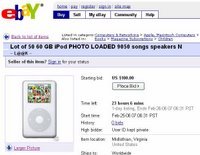Judging by the way the Recording Industry Association of America (RIAA) and Motion Picture Association of America (MPAA) are pushing for more all-encompassing copyright laws, we can’t help but feel like criminals whenever we burn our collection of MP3s onto another CD. Copyright, it seems, is a misnomer; it should be called “copywrong”
Such feelings are further aggravated by the fact that the two organizations are actively lobbying for legislation in the U.S. to embed digital rights management (DRM) in any “interactive digital device”.
An interactive digital device is taken to mean any hardware or software capable of “storing, retrieving, processing, performing, transmitting, receiving or copying information in digital form”. That sounds like nearly all consumer electronic devices and PCs in the market today.
It’s no secret that content publishers have been waging commercial and legislative war on piracy for some years now. It all started with the controversial Digital Millennium Copyright Act (DMCA) which, despite energetic public outcry over its impact on the doctrine of “first sale” (the right to resell or make personal copies of a copyrighted work without a publisher’s permission) and a copyright law that permits the owner of a computer program to make a backup copy, was passed into law in 1998.
Since then, the DMCA has resulted in several high profile brouhahas. The Act was used by copyright owners, for instance, to prevent the publisher of 2600: The Hacker Quarterly (www.2600.com) from distributing copies of a DVD descrambling program as well as to prevent Professor Edward Felten (one of eight researchers who reverse engineered the recording industry’s digital copy protections) from publishing his research.
It also led to the arrest of a Russian programmer named Dmitri Sklyarov for explaining how one e-book encryption system works, in a technical paper based on PhD research publicly presented.
The latest saga involves the U.S. Customs Service, which tried to stop the import of NEO4s, a chip that allows PlayStation consoles to run DVDs with geographic encryptions and games copied onto CD-ROMs. The reason? These chips (also known as “mods”) violated the DMCA because they have the potential to circumvent copy protections. This is despite the fact that PlayStation 1 games are not encrypted, prompting Electronic Frontier Foundation (www.eff.org) attorney Fred von Lohmann to remark, “I guess when you’ve got the big hammer of the DMCA, everything starts looking like a nail.”
Little wonder opponents of the DMCA have complained that the law denies consumers the right to use products bought for personal consumption in whatever ways they see fit. Together with a host of DRM technologies, it is possible that the public’s first sale and archiving rights could be seriously curtailed.
So where does that leave us? Does it mean the next time I rip that irritating Oops!… I Did It Again to my MP3 player, I’ve got to ask Jive Records, “May I?”
If, oops… my memory fails me again (which is very often these days), and I (conveniently) forget to cover my ass by asking for the necessary permission, does that mean I have broken copyright laws and will be liable for prosecution?
When is a CD not a CD?
To add insult to injury, the major record labels – Bertelsmann’s BMG Entertainment, Vivendi Universal’s Universal Music Group, Sony Music Entertainment, EMI Recorded Music and AOL Time Warner’s Warner Music Group – have introduced a new breed of CDs with anti-copying mechanism. These CDs contain countermeasures that prevent playback on computers, and as the argument goes, by doing so, consumers will not be able to rip the music into the easily traded MP3 format.
Unfortunately, because of the large number of different CD players in the market, it is likely that some older players may not be able to read the new CDs. Unless someone comes up with a cheap and easy way to retrofit these old players, chances are that many honest owners could be left out in the cold.
Citing conformity issues, Philips, which jointly developed the CD technology with Sony back in 1978, has refused to play along with the record labels. The Dutch consumer electronics giant warned the recording industry that the new disks are technically not CDs anymore and must bear warning labels to inform consumers. In fact, Philips might demand the record labels to refrain from stamping the familiar “Compact Disc” logo onto those disks that have been copy-proofed, since it holds the right to the logo. Ironic, isn’t it?
But the worse is yet to come. Fearing that without strong copy protection in place, digital versions of movies will be pirated as readily as MP3s once were with Napster, Hollywood executives are aggressively pushing for a copy-protection bill that would make it “unlawful to manufacture, import, offer to the public, provide or otherwise traffic in any interactive digital device that does not include and utilize certified security technologies that adhere to the security system standards”.
If approved, the law could dramatically alter the way system OEMs design and develop PCs, TVs, set-top boxes and other digital appliances with embedded microprocessors. It would also cast a shadow over some of the hottest emerging business models – from network-attached storage to digital video recording to the much-maligned peer-to-peer technology.
However, some security experts have called into question the soundness of such copy protection measures. The general consensus is that the entertainment industry is simply trying to exert control over the hardware and software as it attempts to turn the PC into an entertainment console.
Lost cause?
As everyone who has not been under a rock since Napster’s demise knows by now, technology makes stopping illegal file exchange a problem of impossible proportions. But that doesn’t mean we have to stop technological advancement in its tracks.
The RIAA and MPAA (or any other content publisher, for that matter) may think that embedded DRM is the magic bullet that will nail the tricky copy protection issue, but its adoption depends very much on whether they can overcome industry and consumer opposition.
As it is, sceptics perceived most anti-piracy measures are borne of panic and greed. To some of them, copyright appears to be a tool for large corporations to indefinitely prolong their control of a market. Already, we have seen the duration of copyright protection being extended from 14 years a century ago to 70 years beyond the creator’s death now.
And because copyright law also precludes “derivative use” of copyright material, people cannot develop new material based on copyrighted work without permission. This, argued Stanford technology law professor Lawrence Lessig, radically changes how human culture will evolve, since “the property owner has control over how that subsequent culture is built”. Problem is, the Big Five record labels control roughly 85% of the music being distributed.
It is obvious that the RIAA and MPAA have their self-interest very much at heart when they called for more legislation to protect copyright. However, by compelling technology companies to bend over backwards to accommodate this self-interest, the two organizations, in my humble opinion, has missed the forest for the trees.
Rather than rely on law enforcements, it would be best to leave it to the marketplace to decide what, if any, kind of copy protection measures would be in the best interest of copyright owners without compromising consumers’ side of the copyright balance. After all, it is consumers who justify the existence of copyright owners. No consumption = no revenue = no point holding on to a worthless copyright, right?
P.S. Some copyright laws may have been broken in the course of writing this article. Unfortunately, I have destroyed all the evidence.

